A good digital marketing software in your agency’s toolbelt is necessary in today’s digitally driven world, and more options are available than ever.
Marketing software and business tools can be powerful options to help your agency reach a wider audience with less effort. We’re talking about software that greatly impacts your workflow, provides great ROI and even helps with content creation.
So how do you decide which software is right for you and your marketing team?
To help you make the best-informed decision, we’ve rounded up 12 of the best software on the market today. Dive in to learn about each tool’s best features, limitations, pricing, and reviews!
What is Marketing Agency Software?
Marketing Agency software provides marketing teams with high-quality services—whether for branding, setting KPIs, or content or project management. These tools help them plan and track projects or analyze their campaign’s marketing data to ensure smooth sailing.
Simply put, marketing software is one of the easiest ways to ensure and show your team puts their best foot forward when creating content for any client’s marketing efforts, whether launching new marketing campaigns, trying new social media platforms, or analyzing customer journeys.
Benefits of Using Marketing Agency Software
In its State of Marketing Trends Report 2020, HubSpot found that 91% of marketers felt “somewhat confident” or “very confident” when investing in products that influenced revenue. However, nearly 25% of marketers weren’t reporting how their campaigns affected revenue.
Marketing software helps connect these dots by providing essential data on the campaigns that lead to client acquisition, assist with search engine optimization (SEO), and improve workflow management.
Additionally, here are a few other key benefits of using marketing tools for your agency:
- Manage multiple projects and clients with unique campaigns
- Automate and streamline your workflow processes
- Flexibility and advanced features to help you launch and manage marketing campaigns
- Provide valuable performance data and insights from marketing campaigns
- Give you the confidence to make more informed business decisions
- Get access to templates for managing campaign calendars, campaign tracking, and more
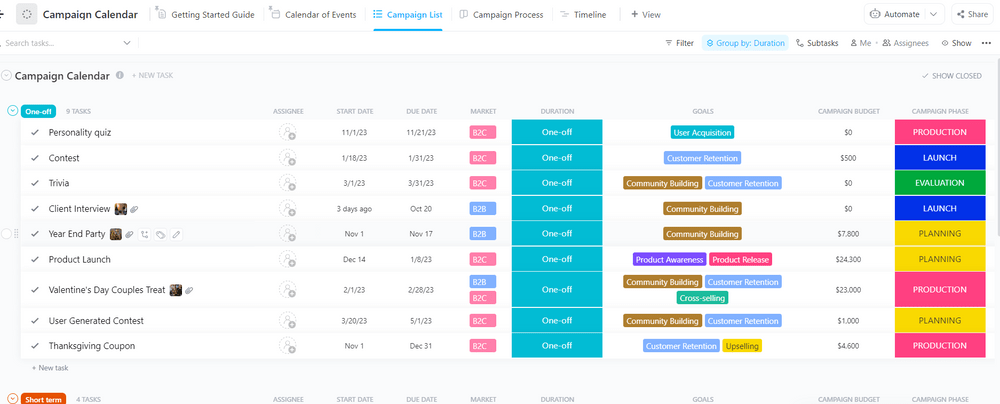
But that isn’t all.
Imagine how messy things could get if marketing teams hadn’t access tools like project management software to keep projects going. Or how tedious it would be to create and send email marketing newsletters manually, set up landing pages, or generate new branded content.
So, let’s talk about how and what you can improve by implementing project management and digital marketing tools to level up your marketing efforts and win more clients.
12 Best Marketing Agency Software for Your Business in 2023
Let’s get into 12 of the best marketing agency management software available today!
1. ClickUp
Best for project management and team collaboration
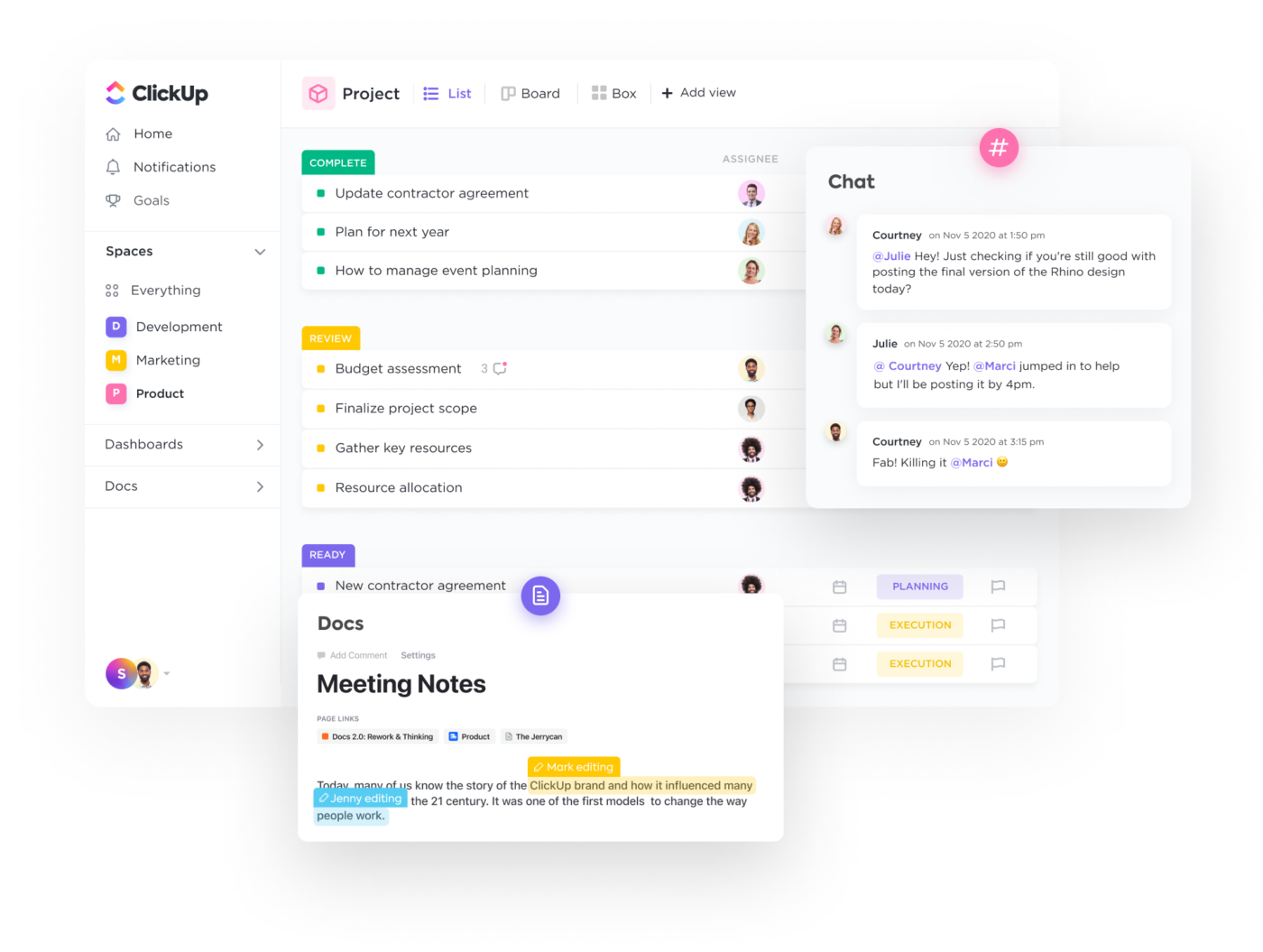
First up is ClickUp—an all-in-one project management and productivity tool designed for every type of team across industries, including marketing agencies.
Best known for its fully customizable platform, teams can configure ClickUp to fit their unique workflow and adjust it as their business scales. This level of flexibility gives marketing agencies and any team the ability to create streamlined processes, improve visibility into key projects and timelines, put marketing plans into action, and enhance team collaboration and productivity.
With hundreds of customizable features and a robust Hierarchy structure, teams can work on multiple projects and clients and keep their work organized at all times. Use Spaces, Folders, and Lists to organize and separate your work for each client, ensure you can get a high-level overview of all projects, and know exactly where each detail fits in your clients’ projects.
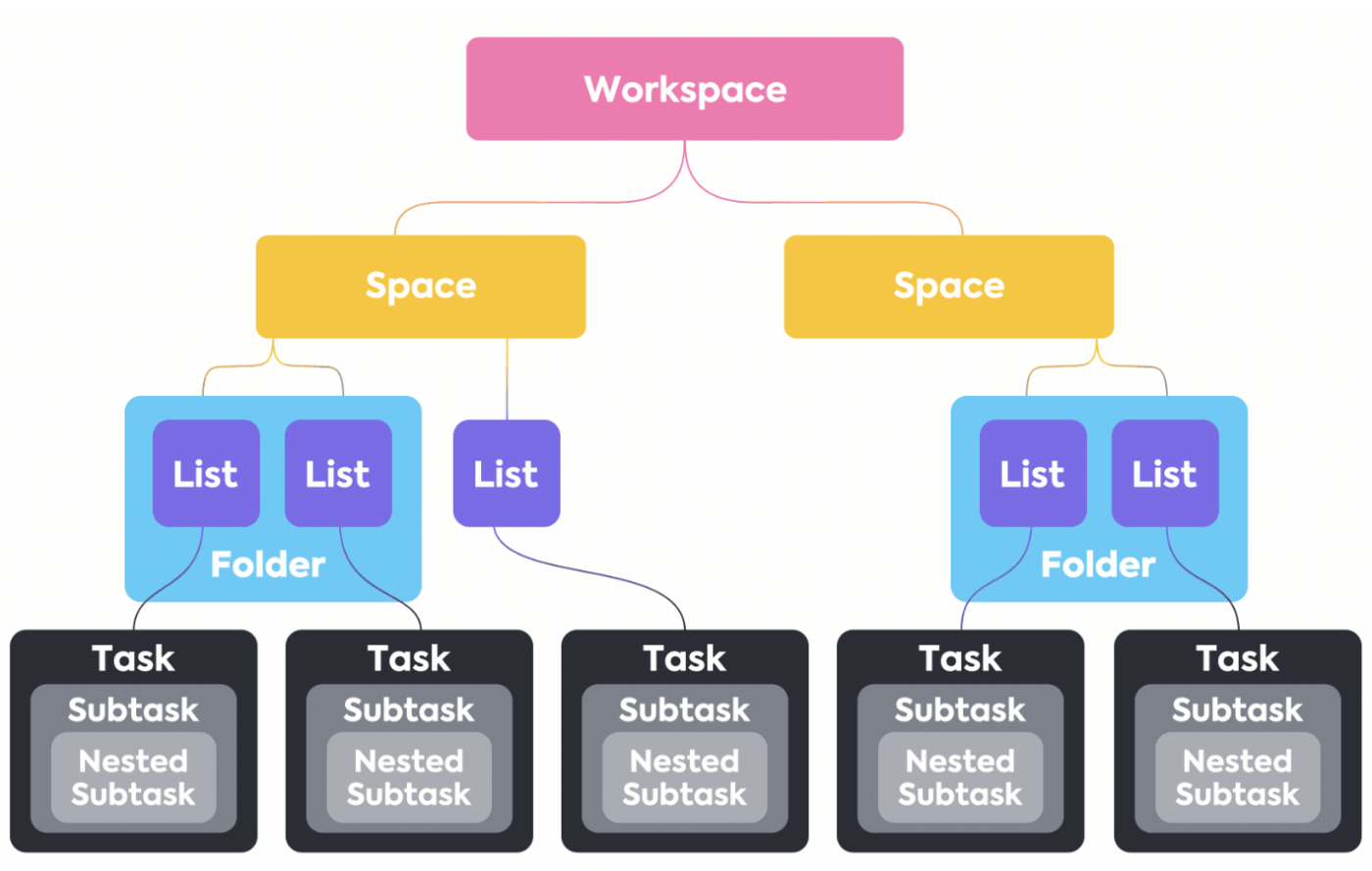
What makes ClickUp one of the best project management software for marketing agencies is its collaboration features. It’s packed with features like ClickUp Docs, Whiteboards, assigned comments, Custom Statuses, built-in Chat view, proofing and annotation, and so much more to allow your internal teams and clients to keep communication streamlined and speed up the feedback process.
And with its privacy, permissions, and sharing controls, marketing agencies can invite clients into ClickUp as a guest and set what they’re allowed to see in your Workspace and ensure sensitive information remain private.
ClickUp also integrates with over 1,000 work tools. Connect your most important marketing tools together to simplify your workflow and manage multiple clients and projects with ease.
Best features
- 15+ custom views: view your work, your way, including Board, Calendar, and Workload view
- Custom Fields and Custom Statuses: Add as many Custom Fields as needed to give your team and clients the context they need to get on the same page and create Custom Statuses to help track progress
- ClickUp AI: Marketing agencies can leverage ClickUp AI to automate and integrate marketing activities such as budget allocation, creative development, media buying, content creation, marketing analytics and reporting.
- Custom workflow automation: Use pre-built automation or create your own to streamline and put your processes on auto-pilot
- Digital Whiteboards: Map out your marketing strategy in ClickUp Whiteboards and connect them to your work
- Collaborative Docs: Create marketing proposals, plan marketing activities, and more and share them with your team and clients via a public or private link
- Customizable templates: Get access to a library of marketing templates and more
- Integration capabilities: Integrate ClickUp to over 1,000 other work tools, including Hubspot, Gmail, and Slack
- Custom Dashboard with real-time reporting: Create your ideal dashboard and get a high-level overview of your work, resources, and more
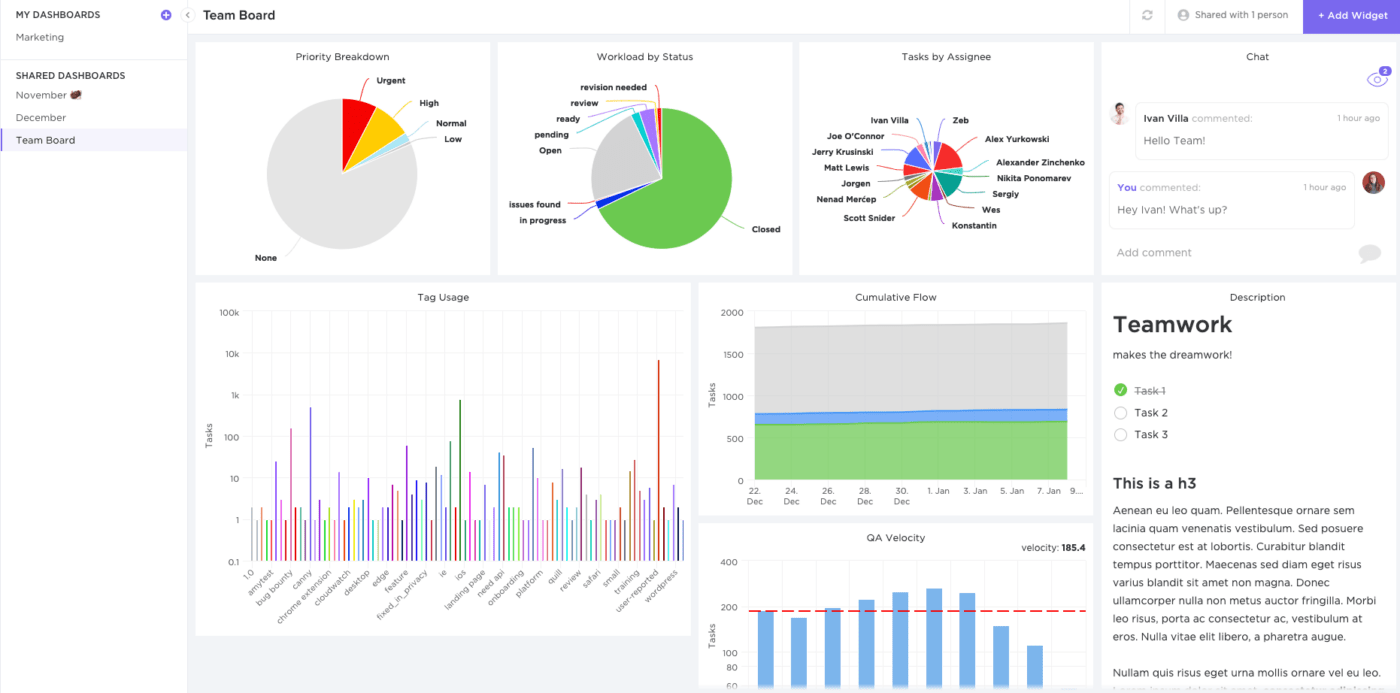
Limitations
- Learning curve due to the number of available features
- No Table view in the mobile app
Pricing
- Free Forever: Feature-rich free plan
- Unlimited: $7 per month/user
- Business: $12 per month/user
- Enterprise: Contact for pricing
Customer reviews
- G2: 4.7 out of 5 (4,780+ reviews)
- Capterra: 4.7 out of 5 (3,070+ reviews)
2. HubSpot
Best for CRM and inbound marketing

HubSpot is well known for its CRM tools, but it also offers a marketing automation tool that handles almost everything.
HubSpot keeps all your marketing activities connected and organized by customers, making it a great fit for agencies. From the time a client fills out a form on your website to their latest phone call with customer support—it gives you insights into how and who has been interacting with your team.
Its marketing tools range from ways to help you build forms and email campaign management to other tools for tracking conversion rates and interactions for your client’s campaigns.
Best features
- CMS system with built-in SEO recommendations
- Analytics tools for email campaigns, landing pages, and other outreach
- Free blog maker plus create other websites with their drag-and-drop builder
- Integrations with thousands of other apps and programs
- A drag-and-drop website builder
Limitations
- The free version includes HubSpot branding on certain features
- Lots of different tools, but less customization as a tradeoff
Pricing
- Free foundational tools are available
- Marketing Hub
- Professional: Starts at $890 per month
- Enterprise: Starts at $3,600 per month
Customer reviews
- G2: 4.4 out of 5 (9,180+ reviews)
- Capterra: 4.5 out of 5 (5,272+ reviews)
Check out these branding templates!
3. Semrush
Best for SEO optimization and researching content ideas
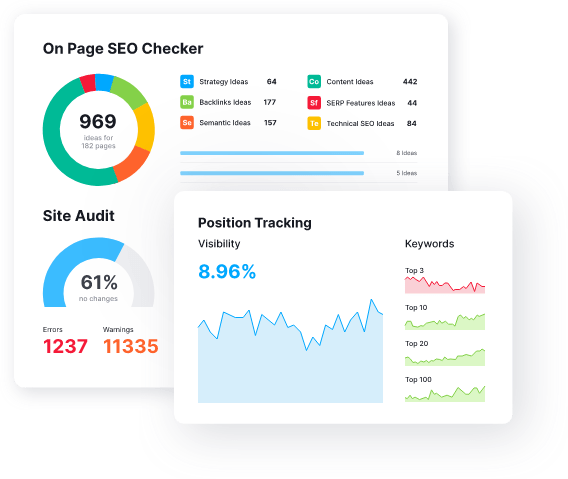
Semrush is all about SEO. You can use it to perform a website audit for your clients to see how they’re doing compared to competitors, check for weak points in their current SEO strategy, and even research keywords to help you develop new content ideas.
Semrush can help you enhance your SEO strategies to get the best results.
Best features
- A huge selection of keyword reports and SEO tools
- Compare with specific websites or across the industry
- Similar phrase and question reports help with keyword research
- AI SEO features
Limitations
- Limited to Google data; doesn’t incorporate other search engines
- Can only run five campaigns in the free plan
Pricing
- Free plan with limited reports
- Pro: $119.95 per month
- Guru: $229.95 per month
- Business: $449.95 per month
Customer reviews
- G2: 4.6 out of 5 (1,667+ reviews)
- Capterra: 4.7 out of 5 (1,981+ reviews)
4. Ahrefs
Best for SEO optimization
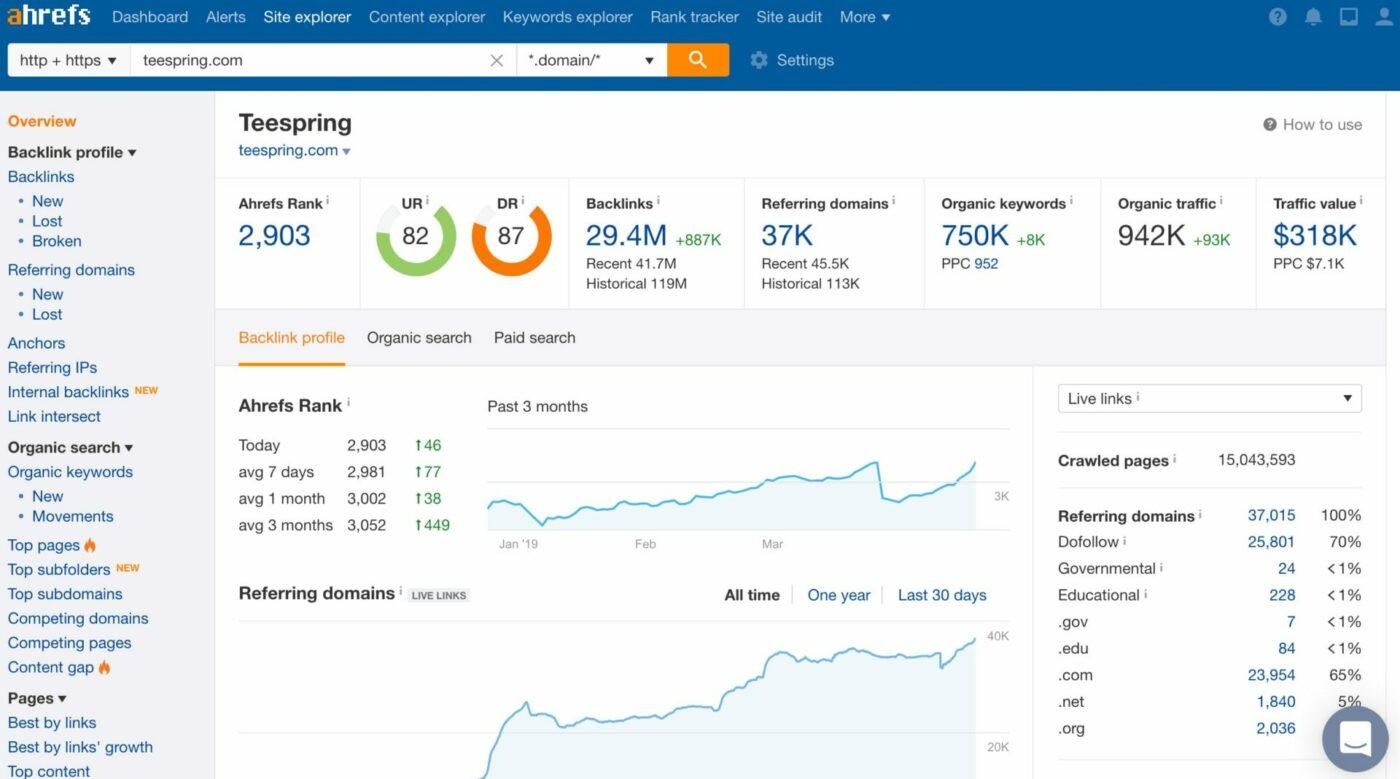
Ahrefs has been one of the most popular SEO tools around for years, and here’s why. With its analytics tools crawling the internet, Ahrefs has access to insightful data on SEO performance.
You can see how a client’s website is performing, run competitor research, and take steps to emulate successful strategies. Ahrefs also has an extensive library of learning material to help you make the most of its tools.
Best features
- Proprietary SEO analytics
- Customizable reports on specific pages, subdomains, and performance updates
- The Content Gap feature helps you discover areas where your client could use additional content
Limitations
- Keyword recommendations can sometimes have low volume
- Limitations on exporting data
Pricing
- Limited free plan
- Lite: Starts at $99 per month
- Standard: Starts at $199 per month
- Advanced: Starts at $399 per month
Customer reviews
- G2: 4.6 out of 5 (446+ reviews)
- Capterra: 4.7 out of 5 (458+ reviews)
5. Google Analytics
Best for ad management, tracking trends, and measuring performance
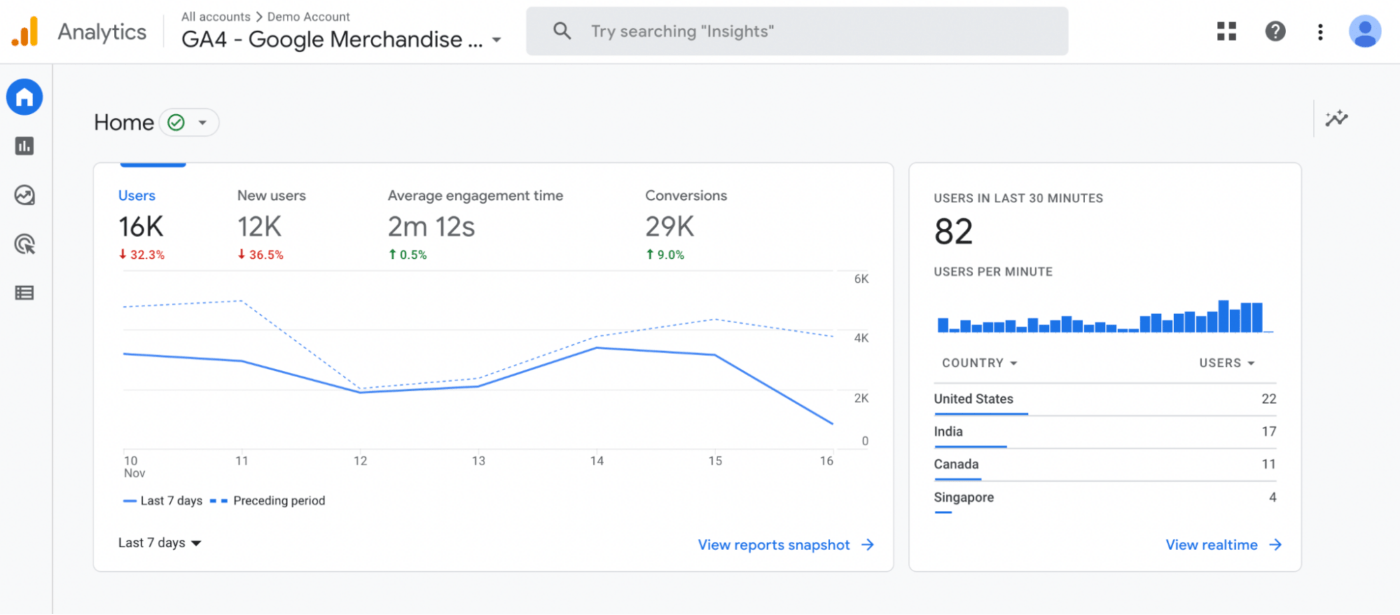
Google Analytics is another marketing solution that’s been around for years. It can be deceptively simple, but it provides hundreds of unique reports and insights into a wide range of data. You can track the performance of a client’s website, including keeping an eye on their inbound marketing.
However, the real star is the Google ads reports. You can see how your client’s paid search performs, track how it compares to other channels, how much revenue it brings in, and other useful data.
Best features
- Track Google ads spending
- View customizable reports based on your metrics
- Break down by country, device, engagement time, and more
Limitations
- It can be difficult to get started with and navigate all the different dashboards
- Higher learning curve; some users find the interface difficult to use
Pricing
- Free
Customer reviews
- G2: 4.5 out of 5 (5,949+ reviews)
- Capterra: 4.7 out of 5 (7,335+ reviews)
Bonus: Check out these real estate marketing tools!
6. NapoleonCat
Best for social media management

NapoleonCat is a social media management platform. It helps you keep track of a client’s engagement and social media sales, analyze their various accounts, and follow up with their subscribers from one inbox.
You can track clients’ performance on major platforms such as Facebook, Instagram, Twitter, and LinkedIn and generate reports based on this data.
Best features
- Link multiple accounts to one inbox
- Automate replies and postings to social media
- Track individual posts and compare them to previous levels of engagement
Limitations
- Can sometimes lose connections to specific pages on accounts
- Data available varies by social media platform
Pricing
- Free 14-day trial
- Standard: $25.82 per month, billed annually
- Pro: $63.31 per month, billed annually
- Custom: Contact for pricing
Customer reviews
- G2: 4.8 out of 5 (58+ reviews)
- Capterra: 4.7 out of 5 (45+ reviews)
7. Canva
Best for graphic design tool

Canva makes it easy to create unique and personalized content. Its drag-and-drop editor allows you to create social media images, infographics, and videos or choose from hundreds of other templates for your agency.
With Canva, you can be sure all your images are the right size, easily keep your work on brand for each client, and even collaborate with others using its team feature. That is especially great if your clients prefer a more hands-on approach.
Best features
- Drag-and-drop editor
- A library of easy-to-use and customizable templates
- Invite collaborators and clients to your account and work on projects together
Limitations
- Limited design options on the free plan, especially for video editing
- Export options are limited
Pricing
- Canva Free: Free
- Canva Pro: $119.99 per year for one person
- Canva for Teams: $149.90 per year for the first five people
Customer reviews
- G2: 4.7 out of 5 (3,796+ reviews)
- Capterra: 4.7 out of 5 (10,826+ reviews)
8. Sprout Social
Best for social media management
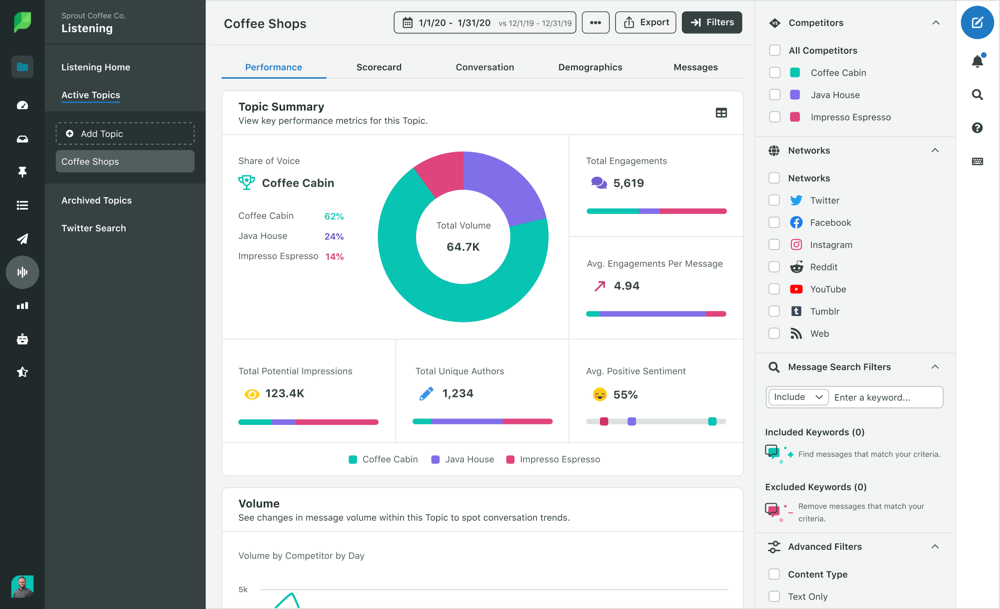
Sprout Social is another great social media-focused marketing software with more emphasis on driving sales. It helps you track your clients’ performance across different platforms and analyze which of these sites bring in the most traffic, revenue, and increased engagement.
It also helps you figure out the best time to post content on their platforms to reach the largest audience, measure how it performs, and provide cross-network analytics and powerful segmentation for each platform.
Best features
- Paid promotion analytics
- One of the few options with TikTok tools
- Focus on revenue, not just user engagement
Limitations
- Can run into errors when one platform’s rules don’t align with others (e.g., max characters on Twitter vs. Instagram)
- Adding additional users can be difficult
Pricing
- Free 30-day trial
- Standard: $249 per month (each additional user +$199 per month)
- Professional: $399 per month (each additional user +$299 per month)
- Advanced: $499 per month (each additional user +$349 per month)
- Enterprise: Contact for pricing
Customer reviews
- G2: 4.3 out of 5 (2,043+ reviews)
- Capterra: 4.4 out of 5 (524+ reviews)
9. AdStage (TapClicks)
Best for cross-platform ad management
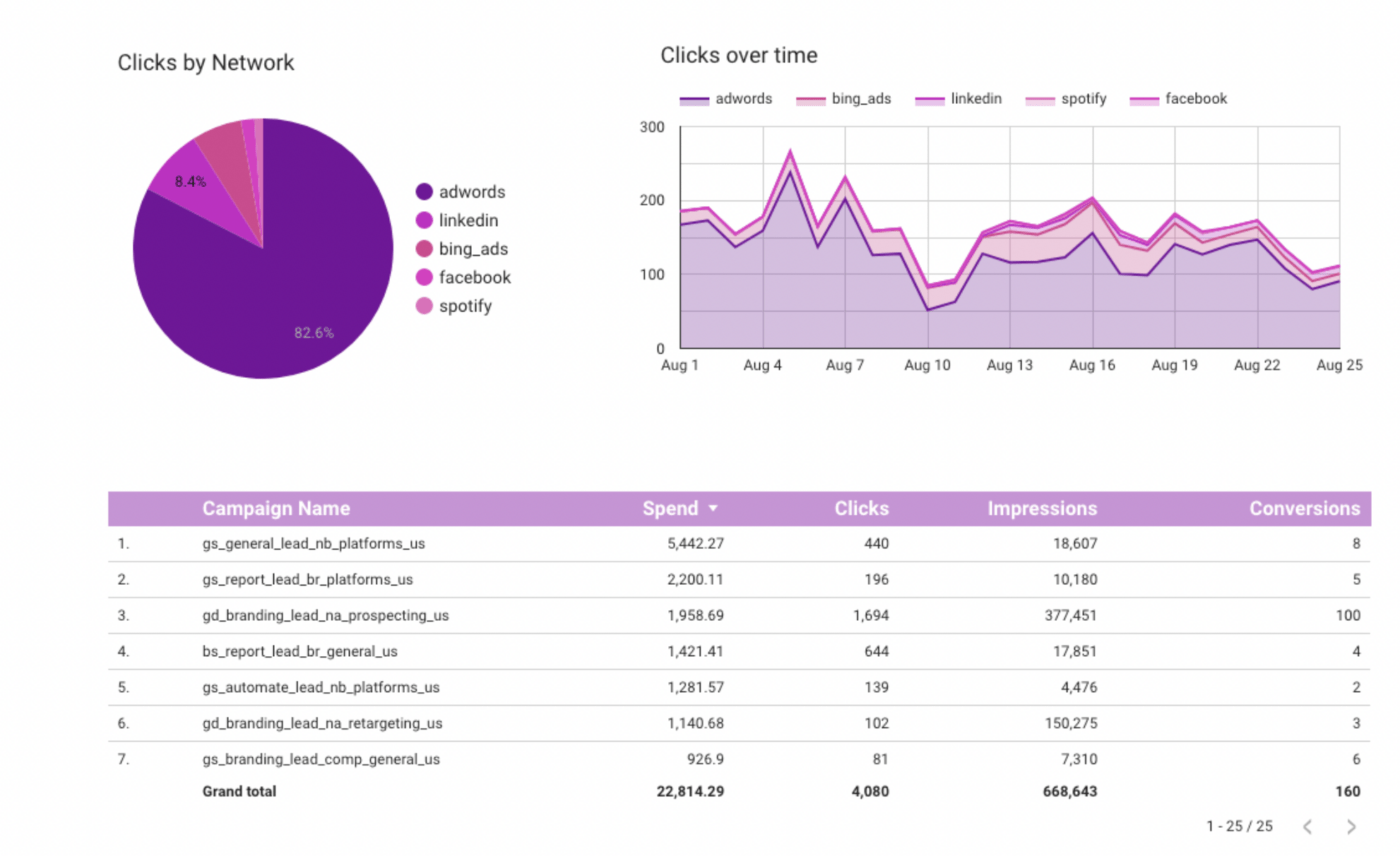
AdStage, recently acquired by TapClicks, is your one-stop source for all your advertising analytics. The marketing software compares your clients’ campaigns across most top ad networks, including Google, Facebook, Spotify, and Bing.
AdStage also helps you automate your advertising. You can set up rules, ad rotation, and schedules within the program.
Best features
- Integrates with most major ad networks
- Can export data to multiple tools, including Google Books
- Easy to compare data between networks in one place
Limitations
- Can be a bit slow to gather all of the third-party data
- Support for smaller networks is limited
Pricing
- Free 14-day trial
- Contact for pricing
Customer reviews
- G2: 4.3 out of 5 (95+ reviews)
- Capterra: 4.5 out of 5 (13+ reviews)
10. ZoomInfo SalesOS
Best for lead generation
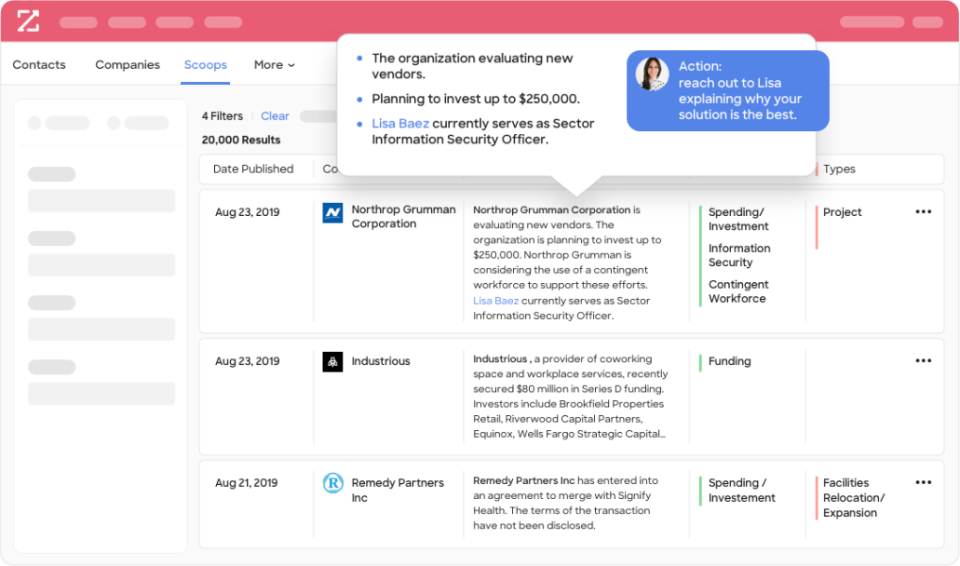
ZoomInfo SalesOS is a B2B-focused marketing platform that helps you identify the best leads for your clients. You can track visitors to their websites, see which competitors their visitors check out, and automate their outreach for them.
Its automation helps them qualify and reach out to only the leads who are most likely to convert. ZoomInfo also integrates with your CRM, helping keep your data up to date and an eye on any existing customers that might be ready to convert again.
Best features
- Lead tracking and qualifying
- Automated outreach based on customizable workflows
- Integrates with many CRMs and other communication tools
Limitations
- The information available for smaller or new companies can be limited
- Contact information is sometimes repeated or outdated
Pricing
- Free trial available
- Contact for pricing
Customer reviews
- G2: 4.4 out of 5 (6,280+ reviews)
- Capterra: 4.2 out of 5 (233+ reviews)
11. Hunter
Best for email search solutions, outreach, and lead generation
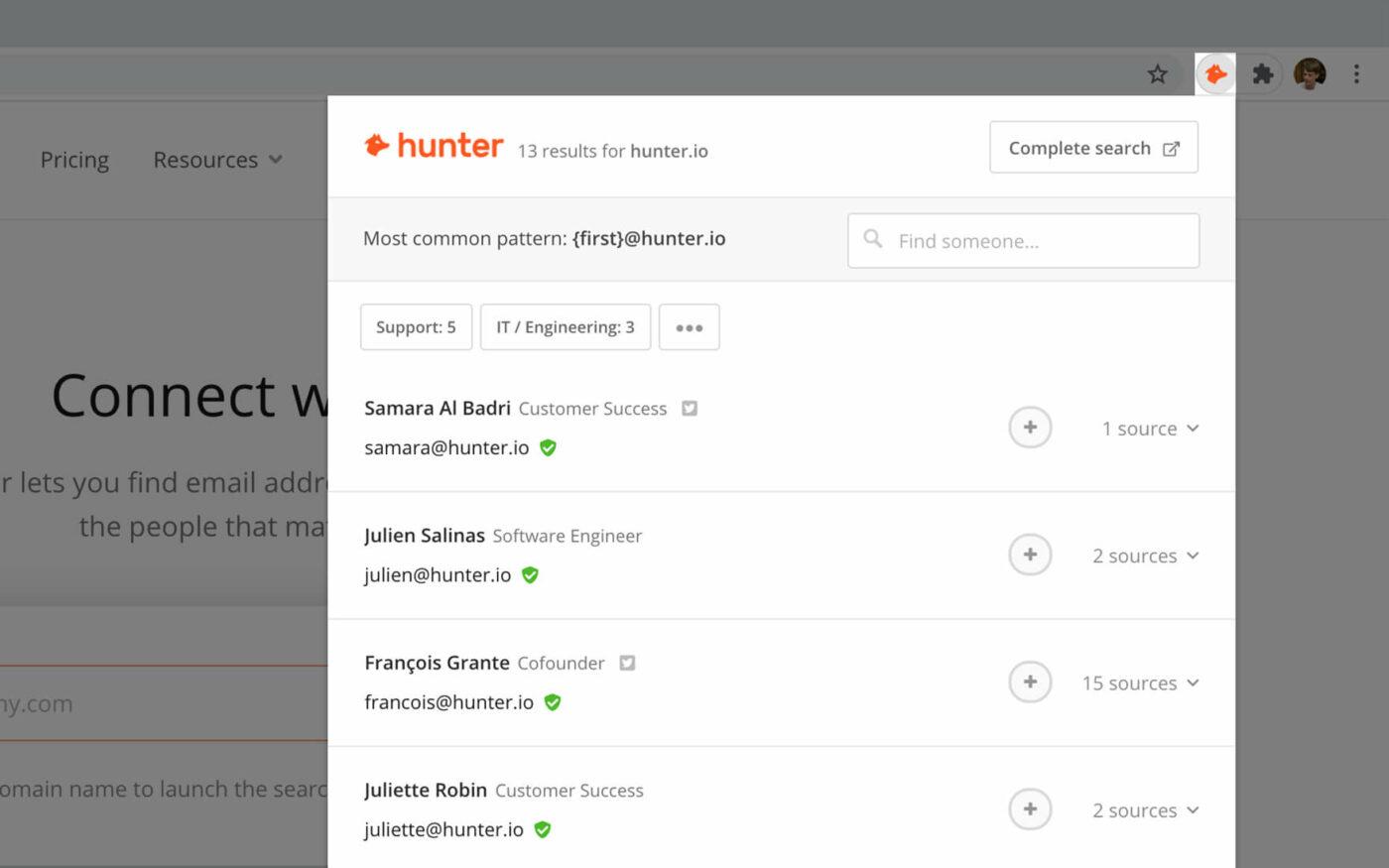
Hunter is an email finder and cold outreach solution that helps with everything from finding and verifying email addresses to sending personalized emails and tracking campaign performance.
Make the most of your outreach efforts by using Hunter to help you automate your cold sequences and get better results through smart personalization. Its bulk tasks features save time, allowing you and your clients to find and verify email addresses from huge lists.
Best features
- Helps find and verify email addresses
- Lets you send personalized email campaigns at a scale
- The bulk task feature helps you deal with email lists
Limitations
- Need a domain-based email to access the tool
- Emails sometimes bounce
Pricing
- Free version with limited credits
- Starter: $49 per month
- Enterprise: Contact for pricing
Customer reviews
- G2: 4.4 out of 5 (462+ reviews)
- Capterra: 4.6 out of 5 (557+ reviews)
12. Paperform
Best for workflow automation and lead generation
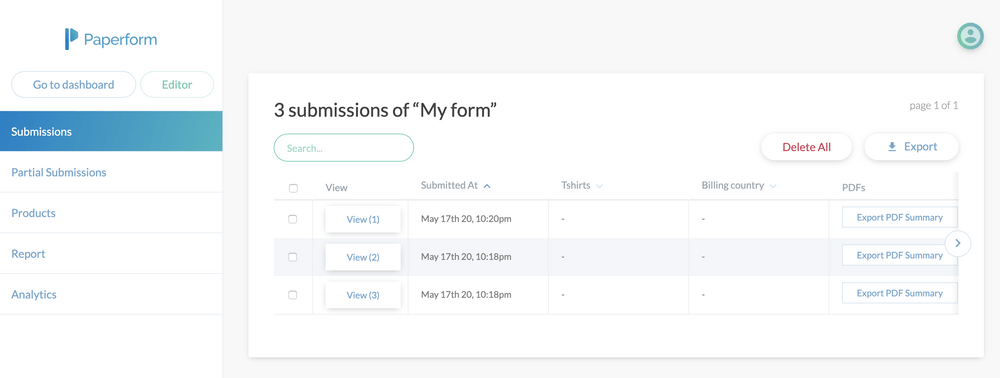
Paperform is more than a form builder. It’s a digital Swiss Army knife for small businesses with the ideal balance of beauty and brains.
You can use it to design lead generation forms and surveys, but you can also create bespoke landing pages, lead magnet popups, and even build dedicated apps for your client’s businesses.
Paperform empowers you to create a range of automated workflows. Plus, it integrates with thousands of tools like Google Drive, Slack, Dropbox, monday.com, and Notion. With an intuitive interface and versatile features, Paperform is one of the most flexible workflow apps available.
Best features
- Build automated, on-brand workflows, surveys, and forms
- Integrates with thousands of tools, allowing you to accept payments or automatically schedule meetings
- Easy-to-use editor with templates and the ability to customize most features
Limitations
- While you can customize a lot, you can’t automatically apply these changes across your forms
- Limited direct integrations with other platforms
Pricing
- Free 14-day trial
- Essentials: $20 per month
- Pro: $40 per month
- Agency: $135 per month
Customer reviews
- G2: 4.5 out of 5 (41+ reviews)
- Capterra: 4.8 out of 5 (84+ reviews)


